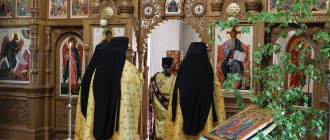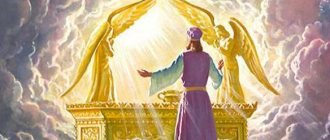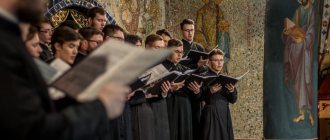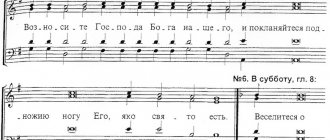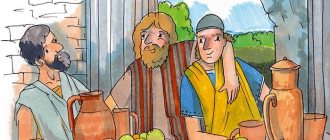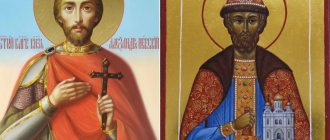Only Begotten Son
“The only begotten Son and Word of God, He is immortal, and He willed for our salvation to be incarnate from the Holy Theotokos and the Ever-Virgin Mary, immutably made man; "Crucified Christ God, trampling death by death, One of the Holy Trinity, glorified to the Father and the Holy Spirit, save us."
At each Divine Liturgy we hear an amazing hymn that invisibly touches the soul of every person praying in the church and evokes deep inner reflection, shifting attention from the biblical texts of the Old Testament to the texts of the New Testament, from the prophecies of the Incarnation expressed in the psalms of the first two antiphons to the Beatitudes . It is always sung after the second antiphon, no matter what antiphons there are and no matter what holiday is celebrated (antiphons are chants consisting of verses of psalms that are sung at the beginning of the Divine Liturgy). The chant “Only Begotten Son” was composed, according to legend, by Emperor Justinian in order to refute the non-Orthodox teaching about Jesus Christ. It represents a confession of faith in the Incarnation of Christ and is a brief expression of the Orthodox teaching of the Church about the Theanthropic nature of the Lord Jesus Christ, who suffered for our salvation.
In the “Chronography” of the Monk Theophan the Confessor, there was a record of the introduction by Emperor Justinian of the chant “Only Begotten Son” into Constantinople worship in the second year of the bishopric of Agapit I, Pope of Rome, in 535 or 536. George Kedrin at the end of the 11th century in the “Historical Synopsis” attributed the same event to the 2nd year of the reign of Justinian, that is, to 528. The origin of the chant is also associated with the name of Emperor Justinian, Paul the Deacon (8th century) and the author of the liturgical commentary of the 12th century ., inscribed with the name of St. Sophronius of Jerusalem. The first known mention of exactly what place this chant occupied in Constantinople worship is contained in a liturgical commentary of the 8th century. “Ecclesiastical History”, or “The Secret History of the Catholic Church”.
If we try to translate this wonderful and very spiritually deep chant into Russian, we will hear: “Oh, Christ God, the Only Begotten (i.e., the only) Son, the Word of God, the Eternally Immortal, who deigned to be incarnated for the sake of our salvation from the Holy Mother of God and the Ever-Virgin Mary, without any change (in Yourself) become human and give Yourself to be crucified! You, who have trampled death by death, One of the (Persons) of the Holy Trinity, glorified together with the Father and the Holy Spirit, save us!” The Son of God is called the Only Begotten, since He, as the Second Person of the Most Holy Trinity, is the only Son of God the Father by nature. The chant especially emphasizes that the Son of God became man, while remaining unchanged God. In addition, the “immutability of incarnation”, in all likelihood, means here that the human nature of the Lord did not “dissolve” into the divine, as the Monophysites claimed.
The words “One of the Holy Trinity, glorified to the Father and the Holy Spirit” testify that the Son of God and the Son of Man, Jesus Christ, is one of the inseparable Persons of the Holy Trinity and has equal honor and glory along with God the Father and the Holy Spirit. Only such a God is the true God-man.
The hymn “Only Begotten Son” glorifies the One who became incarnate on earth to save humanity, Who in the sacrament of Communion desires to unite everyone with Himself as the Source of grace. For this reason, believers gather for the Divine Liturgy. Listening to this liturgical hymn, even those who do not yet fully understand the meaning of these words can feel how they are revealed in his heart - and even more so they are touched by these words when they realize their content and meaning.
In the iconostasis of the Annunciation Cathedral of the Moscow Kremlin there is the only known icon of the Only Begotten Son, dating back to 1547 and painted during the restoration after the great Moscow fire. On the upper right mark of the icon, the content of the verse is presented in the images: “The only begotten Son, and the Word of God, is immortal, and deigned for our salvation to be incarnate from the holy Theotokos, and the Ever-Virgin Mary, immutably made man; "Crucified Christ God, trampling death by death, One of the Holy Trinity, glorified to the Father and the Holy Spirit, save us."
The phrase “Only Begotten Son” is found in John 3:16: “For God so loved the world that he gave his only begotten Son, that whoever believes in him should not perish but have eternal life.” The word "only begotten" in the original Greek sounds like "monogenesis". This word is translated differently - “only” or “only begotten.”
It is this last option (“only begotten” used in some translations, particularly the Synodal translation cited above) that causes problems. False teachers seize on this to prove their teaching that Jesus Christ is not God, that is, that in His essence He is not equal to God, being the second Person of the Trinity. They see this word "only begotten" and say that Jesus is a created being because only one who has a beginning in time can be "begotten." The only point they miss is that "only begotten" is a translation of the Greek word. Thus, we must look at the original meaning of the Greek word and not add our own meaning to the text.
So what does “monogenesis” mean? According to Greek New Testament dictionaries, “only begotten” has two main definitions. The first definition is “to be one of a kind in a particular respect.” This meaning is used in Hebrews 11:17, where the author calls Isaac the “only begotten son” of Abraham. Abraham had more than one son, but Isaac was the only son by Sarah and the only son of the covenant.
The second definition is “to be one of a kind or class, unique.” This is what is meant in John 3:16. In fact, John is the only New Testament writer to use this word in reference to Jesus (see John 1:14, 18; 3:16, 18; 1 John 4:9). John primarily wanted to demonstrate that Jesus was the Son of God (John 20:31), and he used this word to distinguish Jesus as uniquely God's Son - having the same divine nature as God - in contrast to believers, who are sons and daughters of God through faith.
The point is that terms like "Father" and "Son" that describe God and Jesus are human terms used to help us understand the relationship between the various Persons of the Trinity. If you can understand the relationship between a human father and son, then you can understand in particular the relationship between the First and Second Persons of the Trinity. The analogy loses its meaning when one tries to take it too far and teach, as some Christian cults (such as Jehovah's Witnesses), that Jesus was literally "begotten," that is, "produced" or "created" by God the Father.
Psalm 102
Font
Psalm to David | Psalm of David. |
| 1 Bless the Lord, my soul, and all that is within me, bless His holy name. | 1 Bless the Lord, O my soul, and bless all that is within me, His holy name. |
| 2 Bless the Lord, my soul, and do not forget all His rewards, | 2 Bless the Lord, my soul, and do not forget all His rewards: |
| 3 Who cleanses all your iniquities, who heals all your diseases, | 3 He forgives all your iniquities, He heals all your diseases, |
| 4 who delivers your belly from corruption, who crowns you with mercy and compassion, | 4 He delivers your life from destruction, crowns you with mercy and compassion, |
| 5 who fulfills your good desires: your youth will be renewed like an eagle. | 5 He fulfills your desires with good things; your youth will be renewed like an eagle’s. |
| 6 The Lord give alms and fate to all who are offended. | 6 The Lord shows mercy and judgment to all who are wronged. |
| 7 Moses told the sons of Israel his ways and his desires: | 7 He made known His ways to Moses, and His desires to the children of Israel. |
| 8 The Lord is generous and gracious, slow to anger and abounding in mercy. | 8 The Lord is generous and gracious, slow to anger and abounding in mercy, |
| 9 He is not completely angry, he is always at enmity, | 9 He is not completely angry and is not forever indignant. |
| 10 He did not cause us to eat because of our iniquities, but according to our sins He repaid us to eat. | 10 He did not deal with us according to our iniquities, nor did He reward us according to our sins, |
| 11 For according to the height of the heavens from the earth, the Lord established His mercy on those who fear Him. | 11 For, according to the height of the heavens from the earth, the Lord established His mercy towards those who fear Him; |
| 12 Because the east is far from the west, he has removed our iniquities from us. | 12 As far as the east is from the west, He has removed our iniquities from us. |
| 13 As a father gives generously to his sons, the Lord will provide for those who fear Him. | 13 Just as a father shows mercy to his sons, the Lord has mercy on those who fear Him, |
| 14 Because He knew our creation, I will remember Him, like the dust of Esma. | 14 For He knows our composition, He remembers that we are dust. |
| 15 Man, like the grass of his days, like the flower of the field, will blossom, | 15 A man is like the grass of his days, like the flower of the field, so he shall blossom, |
| 16 For a spirit has passed through him, and is not, neither does he know his place. | 16 For the breath has ceased in him, and he will no longer be, and he will no longer know his place. |
| 17 But the mercy of the Lord is from everlasting to everlasting on those who fear Him, | 17 But the mercy of the Lord is from everlasting to everlasting on those who fear Him, |
| 18 And His righteousness is upon the sons of sons, who keep His covenant and remember His commandments to do. | 18 And His righteousness is upon the sons of sons, who keep His covenant and remember His commandments to do them. |
| 19 The Lord has prepared His Throne in Heaven, and His Kingdom possesses all. | 19 The Lord has prepared His throne in heaven, and His kingdom rules over all. |
| 20 Bless the Lord, all His angels, who are mighty in strength and do His word, to hear the voice of His words. | 20 Bless the Lord, all you His angels, mighty in might, who do His word, as soon as they hear the voice of His words. |
| 21 Bless the Lord, all His might, His servants who do His will. | 21 Bless the Lord, all your armies, all your servants, who do his will. |
| 22 Bless the Lord, all His works, in every place of His dominion; bless the Lord, my soul. | 22 Bless the Lord, all His creatures, in every place of His dominion. Bless the Lord, my soul! |
| Glory: | Glory: |
Bless, my soul, the Lord, and all that is within me, His holy name. Bless the Lord, my soul, and do not forget all His rewards, who cleanses all your iniquities, heals all your ailments, delivers your belly from corruption, crowns you with mercy and bounty, fulfills your desire for good: your youth will be renewed like an eagle. The Lord grant alms and destiny to all those who are offended. Moses told His way to the sons of Israel His desires: The Lord is generous and merciful, long-suffering and abundantly merciful. He is not completely angry, he is at enmity forever, he did not create food for us because of our iniquities, but he rewarded us with food because of our sins. As the height of heaven from the earth, the Lord established His mercy on those who feared Him. The east is far removed from the west, and our iniquities have been removed from us. As a father gives generously to his sons, the Lord will provide for those who fear Him. As we know our creation, I will remember, as the dust of Esma. Man, like the grass of his days, like the flower of the field, will bloom like the spirit that has passed through him, and he will not be, and no one will know his place. The mercy of the Lord is from everlasting to everlasting on those who fear Him, and His righteousness is on the sons of sons, who keep His covenant and remember His commandments to do. The Lord has prepared His Throne in Heaven, and His Kingdom possesses everyone. Bless the Lord, all His angels, mighty in strength, who do His word, to hear the voice of His words. Bless the Lord, all His might, His servants who do His will. Bless the Lord, all His works, in every place of His dominion, bless them, my soul. Gentlemen.
Psalm 101To the listPsalm 103
Orthodox Life
Website of the Gorlovka and Slavic diocese
“And in one Lord Jesus Christ, the Son of God, the only begotten, who was born of the Father before all ages; Light from Light, true God from true God, begotten, uncreated, consubstantial with the Father, to whom all things were.”
The Creed itself is unequal: only the first member speaks about God the Father, and six about Jesus Christ, from the second to the seventh inclusive. The second begins to tell the story of the Savior and focuses on His divine origin, the next ones talk about earthly life after the incarnation.
In ancient centuries, when Christianity spread in the Roman Empire, Christians needed to understand who was in front of them - one of their own or a stranger. There were different ways for such recognition, and one of them was when a believer drew a fish, a symbol of Jesus Christ, in the sand. If in response a person drew the same fish, it was clear that he was a Christian, and you could discuss the basics of faith or some Christian issues with him. After the era of persecution ended, heresies emerged that denied the divinity of Jesus Christ. At the First Ecumenical Council, the Creed was approved, the second member of which asserted that the Lord is the true God, who is born and not created - in contrast to what Arius and his followers claimed.
At our services, the entire church sings the Creed. This is a very good tradition, because this is how we show our unity. It’s like a “friend or foe” recognition system, like a fish that was drawn in the sand in ancient times. We sing together and feel that we are one mystical body of Christ. That is, the Creed is not just another prayer from a collection of prayers, it is a very important element of the life of a Christian. Why is the Creed necessarily present in the prayer rule? - because it is very important to repeat these dogmas daily: they are a summary of our faith. By pronouncing them, we affirm: Lord, we are Yours, we are with You, we want to be like that. Unfortunately, believers often do not realize the relevance of the Creed. I don’t know how it is in other churches, but in mine I often observe that this singing turns not into a moment of worship uniting Christians, but into some kind of confusion and vacillation.
What is the second part of the Creed literally about? It begins with the words that we believe “in one Lord Jesus Christ,” which means: we believe in Jesus (this is a name that translated into Hebrew means “Savior”) Christ - that is, the anointed one (this is how prophets and kings were called ), about whom the Old Testament prophesied, the Messiah for whom the Jewish people were waiting. He Himself confirmed this: “The woman said to Him: I know that the Messiah will come, that is, Christ; when He comes, He will tell us everything. Jesus says to her, “It is I who speak to you” (John 4:25-26); “Let all the house of Israel know this assuredly, that God has made this Jesus, whom you crucified, both Lord and Christ” (Acts 2:36). Lord is a very important word at that time, because in Greek and Latin it was used in relation to the Roman emperors, they were considered to be endowed with power by the gods themselves. And when a Christian said that there is one Lord - Jesus Christ, he thereby denied the divine origin of the power of the Roman emperors, which aroused hatred among them and led to endless persecution.
"In the Son of God, the only begotten, who was born of the Father." Jesus Christ is the Son of God, the only one born of the Father (Only Begotten). That is, no one except Him was born from the Father. If we look ahead, we read that the Holy Spirit comes from the Father, and the Son is born, which means He is precisely the Son, the only Son of the only Father.
“Before all ages” - these words exclude all time frames, that is, they assert that God is outside of time, and thus emphasize that Jesus Christ has always been.
“Light from Light, true God from true God, begotten, uncreated.” These words emphasize that Jesus Christ is not a creation, like people and angels. When this member of the Creed was compiled, the Arian heresy was very widespread, claiming that Jesus Christ was created by God the Father (by the way, Jehovah's Witnesses are now talking about this). According to this heresy, Christ cannot be God, since, they say, He was created, therefore the Creed emphasizes that He is the begotten and uncreated Light from Light, the true God.
“Consubstantial with the Father” - that is, He has one essence with the Father. He Himself testifies to this: “I and the Father are one” (John 10:30), “he who has seen Me has seen the Father” (John 14:9).
“All things were created by Him” - this means that the entire visible and invisible world was created by the Son of God, everything was given through Him. John the Theologian testifies to this: “In the beginning was the Word, and the Word was with God, and the Word was God. It was in the beginning with God. All things came into being through Him, and without Him nothing came into being that was made” (John 1:1-3). That is, the Son of God, as one of the Persons of the Holy Trinity, created the world.
To summarize, the second member of the Creed speaks of the Divinity of the incarnate Son of God, that He is not an angel, but God from God, Light from Light, and possesses the Divine nature in all its fullness, like all the Persons of the Holy Trinity.
There are no unimportant words in the Creed. It seems simple only at first glance. There is so much love in it! Every word testifies to God's love for the human race. He came to earth not to call for it, but to show that He Himself is Love. The words of the Gospel speak about this love: “For God so loved the world that he gave his only begotten Son, that whoever believes in him should not perish, but have eternal life” (John 3:16).
To summarize everything that has been said, the Creed is a hymn to God’s love for people. How can we answer it? Reciprocally.
Archpriest Vladimir Shutov
Recorded by Ekaterina Shcherbakova
